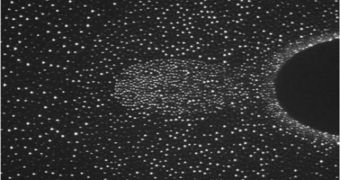The largest advantage that the International Space Station (ISS) has over any other scientific laboratory in the world is the fact that it can easily perform experiments under unique conditions. First and foremost, it's the only place where researchers can conduct experiments in microgravity. This opens up the way for completely new methods of looking at things, and this is precisely why experts at the Max Planck Institute for Extraterrestrial Physics, in Garching, Germany, have sent a series of scientific experiments to the ISS, whose sole purpose is to yield new information on complex plasmas.
The ultimate goal of this investigation is to accurately determine the fundamental structure-forming processes that take place inside solids and liquids. The work is very important for a fairly simple reason. While on our planet three states of matter (liquid, solid, gas) dominate, things are very different within the Universe. Outside the Earth, plasma is the dominant state of matter. This is basically a gas heated at very high temperatures, in which the molecules originally in the mix split into ions and free electrons. Plasma is of paramount importance in nuclear-fusion research, as well as in other areas of expertise, therefore gaining new knowledge on it and a fresh perspective is essential.
What the German team of researchers has discovered is that plasma can take on may properties. They have even shown that it can become a liquid, or crystallize, which is something entirely unheard of. These “complex plasmas” give researchers new data on the basic physical processes going on inside liquids and solids, and looking at these events without the constraint of gravity is something the experts have been eager to do for a long time, ScienceDaily reports.
“In complex plasmas, for the first time we can now study these processes looking at the movement of individual particles and we hope that our latest experiments will lead to new insights into the physics of phase separation,” the coordinator of the PK-3 Plus experiment, MPI expert Hubertus Thomas, says. At this point, plasma research is getting a lot of attention from science groups around the world. Some are even contemplating using it to disinfect wounds or treat conditions of the teeth, though only the cold variation of plasma will be used for the second.

 14 DAY TRIAL //
14 DAY TRIAL //